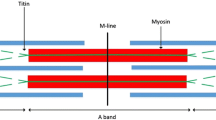Short-term high frequency electrostimulation (8-10 Hz) of the isolated isovolumic rat heart rapidly increased the rate of pressure rise and drop and the diastolic pressure. At the same time, the relaxation rate constant (RRC), being independent of the developed pressure, remained unaltered. These findings suggested that diastolic pressure rise was not caused by incomplete myocardial relaxation. Doxorubicin (3 μM) moderately reduced the developed pressure, but the relaxation rate constant remained unchanged. The dynamics and degree of changes in all indicators of the cardiac contractile function in high-frequency stimulation were the same as in control. It can be hypothesized that the initial effect of doxorubicin was not related to ionic transport system disturbances in cardiomyocytes.
Similar content being viewed by others
References
Abramov AA, Lakomkin VL, Prosvirnin AV, Kapelko VI. Pressure and Volume Characteristics of the Left Ventriclе in Its Diastolic and Systolic Dysfunction. Kardiologiya. 2019;59(4):45-51. Russian.
Lakomkin VL, Abramov AA, Gramovich VV, Vyborov ON, Studneva IM, Pisarenko OI, Kapelko VI. Contractile Function of Isolated Hearts With Preserved and Reduced Ejection Fraction In Vivo. Kardiologiya. 2018;58(4):36-44. Russian.
Lakomkin VL, Kapelko VI. The similarity and difference in the action of adriamycin and hydrogen peroxide on the myocardium. Ross. Fiziol. Zh. 2012;98(2):250-257. Russian.
Hamdani N, Herwig M, Linke WA. Tampering with springs: phosphorylation of titin affecting the mechanical function of cardiomyocytes. Biophys. Rev. 2017;9(3):225-237.
Houser SR, Margulies KB. Is depressed myocyte contractility centrally involved in heart failure? Circ. Res. 2003;92(4):350-358.
Krüger M, Linke WA. Titin-based mechanical signalling in normal and failing myocardium. J. Mol. Cell. Cardiol. 2009;46(4):490-498.
Krysiak J, Unger A, Beckendorf L, Hamdani N, von Frieling-Salewsky M, Redfield MM, Dos Remedios CG, Sheikh F, Gergs U, Boknik P, Linke WA. Protein phosphatase 5 regulates titin phosphorylation and function at a sarcomere-associated mechanosensor complex in cardiomyocytes. Nat. Commun. 2018;9(1):262. https://doi.org/10.1038/s41467-017-02483-3
Maeda A, Honda M, Kuramochi T, Takabatake T. Doxorubicin cardiotoxicity: diastolic cardiac myocyte dysfunction as a result of impaired calcium handling in isolated cardiac myocytes. Jpn Circ. J. 1998;62(7):505-511.
Matsubara H, Takaki M, Yasuhara S, Araki J, Suga H. Logistic time constant of isovolumic relaxation pressure-time curve in the canine left ventricle; better alternative to exponential time constant. Circulation. 1995;92(8):2318-2326.
Meerson FZ, Kapelko VI, Nourmatov AA. Physiological evaluation of the capacity of the diastole mechanism. Acta Cardiol. 1971;26(6):547-567.
Tokarska-Schlattner M, Wallimann T, Schlattner U. Alterations in myocardial energy metabolism induced by the anti-cancer drug doxorubicin. C R Biol. 2006;329(9):657-668.
Author information
Authors and Affiliations
Corresponding author
Additional information
Translated from Byulleten’ Eksperimental’noi Biologii i Meditsiny, Vol. 169, No. 5, pp. 547-550, May, 2020
Rights and permissions
About this article
Cite this article
Lakomkin, V.L., Lukoshkina, E.V. & Kapelko, V.I. Reaction of the Heart to High Frequency Stimulation against the Background of Acute Doxorubicin Treatment. Bull Exp Biol Med 169, 619–622 (2020). https://doi.org/10.1007/s10517-020-04940-4
Received:
Published:
Issue Date:
DOI: https://doi.org/10.1007/s10517-020-04940-4




